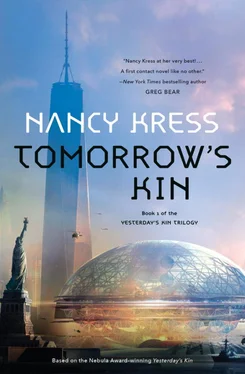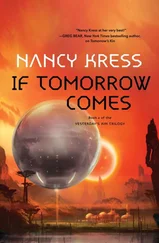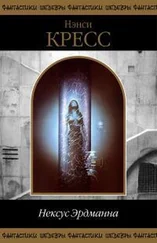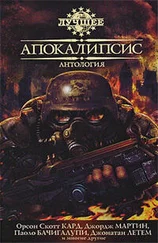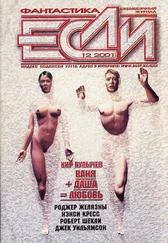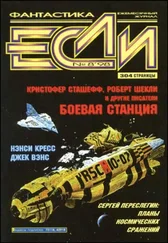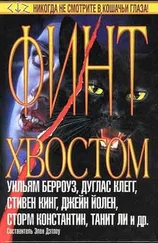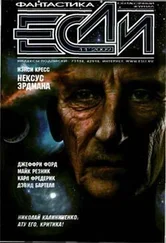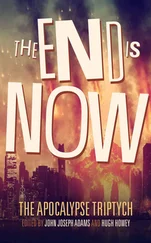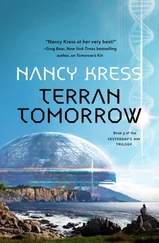Ryan said nothing. But he looked, for the first time since he’d come to Oakwood, as if what she was saying genuinely mattered to him. She didn’t dare stop talking.
“Judy Taunton will stand trial, too, for killing a man named Andrew Stone. You don’t know about that and I won’t explain it now, but Judy’s attorney is positive that she’ll get off. Actually, a whole bunch of Stubbins’s people are being detained until the FBI sorts out who knew what about the mice.”
Ryan didn’t ask about the mice, and Marianne didn’t explain. Nor did she tell him that no charges had been filed against her for Wolski’s murder; the district attorney had decided it was self-defense. Marianne had no idea how much Ryan understood, or had been told, of what had happened aboard the spaceship. Maybe nothing. She was now talking as much to herself as to him, saying aloud all the things that had kept her awake nights during these last painful months. Once she’d started, she couldn’t stop.
“The Venture has been taken over by the government. Some law about seizing property involved in terrorism. I doubt Stubbins will ever get it back.”
“But you know the strange thing, Ryan? The thing that doesn’t fit? Stubbins’s pharmaceutical company just released the drug he developed for children born after the spore cloud. It fast-tracked through the FDA trials without a single hitch. It blocks ultrasonic and infrasonic hearing, so that those who can’t do what Colin and Luke and Ava can, won’t need Calminex. Won’t be little zombies. Stubbins did that. The same Stubbins that could commit an atrocity like weaponizing HFRS.”
Ryan didn’t even blink. His steady, sharp gaze was a beacon, or her need for a beacon.
“I was wrong,” she said. “Completely wrong, a hundred eighty degrees wrong. But I thought that by urging the spaceship to be built no matter what, I was helping promote human cooperation and brotherhood. That’s how I felt when I was researching aboard the Embassy . When Harrison and I were running the Star Foundation. When I was helping Stubbins get to World. I thought that because Worlders and Terrans are both human and not separated by much evolutionary time, we should just establish open communication.”
She let her hands rise, then fall back to her lap. Ryan’s gaze stayed on her face.
“But I was wrong. It can’t be that simple. We can’t have an open highway between Earth and World. It has to be… oh, I don’t know, a toll road. With checkpoints so that not everyone with the money and expertise can just drive past. Because you were right, Ryan. You were right all along.”
His eyes, so completely without Noah’s and Elizabeth’s beauty, sharpened.
“No,” Marianne corrected herself, “you weren’t completely right. You were right to say that on World, we would be an invasive species. An organism not in its native ecological niche, infecting the Worlders with pathogens like Jonah Stubbins. He was a pathogen, yes. But the answer isn’t to never go to World, or anywhere else. The answer is to do what Noah did, to slowly infect each other. In a controlled way. With restrictions on who can go to World, and why. And on who can come here. A slow journey toward brotherhood. Like any two clans would have done when our species was still whole, on the savannah, before Worlders left us in the first place.”
Ryan said something, very low.
“I’m sorry,” Marianne said, “I didn’t hear you? Ryan?”
He said, “I did it.”
She didn’t ask what he meant. She knew. Knew, too, that this secret was what had been destroying him ever since the Embassy bombing. Marianne’s heart shattered and rose into her throat; she couldn’t breathe. Her son had arranged for Evan’s death, for the deaths of the other scientists—
He said, “I gave them the layout of the Embassy , that you told me about. I never thought they’d bring in a bomb. It was supposed to be just a group of spokespeople, with all our arguments against the Denebs’ presence, I never thought they’d… but that doesn’t change my responsibility. I told them. I did it.”
Marianne breathed again.
“No, Ryan—no. If you believed it would be only a peaceful protest, if you didn’t know about the bomb… You can’t destroy yourself with guilt because you were wrong! Everybody is wrong sometimes!” And then, as much to herself as to him, “You can’t control everything.”
Not ecologies, not economies, not superstorms or spore clouds or invasive species. Not one’s own children.
Ryan said nothing. Marianne tried to calm herself; she was shaking. The silence stretched on and on.
Finally Ryan said the same words he’d been uttering for months. This time, however, he said them not as a cry for an uncapturable past, but with their real meaning. “Mom… I want to go home.”
Marianne gazed at him. She saw Ryan the sturdy little boy, tagging after Elizabeth. Ryan the quiet, secretive teen. Ryan the angry conspirator, holding his anger inside. Ryan the invalid, ravaged by his own failure. This was the way it was with one’s children; all the versions of them lived simultaneously in your heart.
“Yes,” she said. “Let’s go home.”
Everything old is new again.
—songwriter Peter Allen
S plus 9 years
Sunday evenings always bustled, she thought, no matter how much planning had gone into the next week. No matter how much relaxation had taken place over the weekend. No matter how lazy the weather, like this warm August sunset of still air, humming crickets, sweet fragrance of lilies.
She sat on the front steps of her rented house, a half-eaten peach juicy in her hand, a stack of textbooks beside her. The children played in the cornfield next door, some game that involved a lot of running and shouting; occasionally one of their bright T-shirts flashed through the stalks, a pink or red or orange comet. Harrison came out of the house, suitcase in hand.
“All packed?” Marianne said.
“I travel light.” He put down the suitcase and lowered himself to sit beside her. “Preparing your syllabi?”
“Nominally, anyway.” The semester started in two more weeks, and she would be teaching two classes she’d taught before and one for the first time, all in evolutionary biology.
He took her hand, a little awkwardly. Their relationship, simultaneously old and new, was still finding its way and, contrary to what Harrison had just said, neither of them traveled light. Too much had happened.
She said, “Good luck with the speech in Chicago.”
“Thanks.” And then, “I wish you were going with me.”
She squeezed his hand. She wrote Harrison’s speeches so he didn’t have to take too much time from his research, but she could not give them herself. No one wanted to hear Marianne Jenner talk about careful screening and control of interaction with World, not after she had spent eight years advocating just the opposite. Flip-flopper was the kindest of the invectives hurled at her now. Most people didn’t, or maybe couldn’t, understand that experience modified political stances, or that isolationism and brotherhood were not a dichotomy but two ends of a continuum, with many viable points between them. She had always fought to protect Earth, but now World needed protection, too. Everything was intertwined—Terra and World, profit and idealism, ecology and progress—and the only way forward was to respect those sometimes inconvenient connections.
Harrison, unlike Marianne, could make these points, and did. His work in neurology had earned him that. The SuperHearers—the media’s dumb name for children born after the spore plague—were now contented pre- and elementary-school kids. Harrison had blended his careful work in neurochemicals and cranial electrical mapping with the hastier research of Stubbins’s pharmaceutical team. The result was Audexica, one of the most successful drugs ever known. Public pressure combined with sheer volume kept the price low. Humanitarian groups had cooperated to manufacture, ship, and distribute it around the world. Eighty-nine percent of Terran children now took Audexica.
Читать дальше
